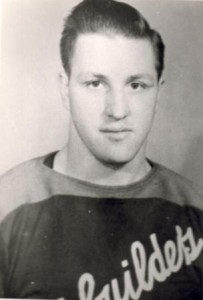 Chub Butters could be classed as one of Collingwood’s best all around athletes because he excelled in track and field, hockey, football, basketball and swimming.
Chub Butters could be classed as one of Collingwood’s best all around athletes because he excelled in track and field, hockey, football, basketball and swimming.
While attending the Collingwood Collegiate he won the Intermediate and Senior track and field championships in 1932 and 1933. A foxy broken field runner on junior and senior high school football teams, he was a star half back with the 1933 Central Ontario Secondary Schools Senior champions in 1933 when his team defeated St. Catherines 12-9 in the final. Chub scored the winning touchdown.
In Inter-Collegiate track and field competitions he set school records in the 100 and 220 yard sprints and in the low hurdles.
His long amateur hockey career started in the old Collingwood Junior Town League when he captained the champion East End Club. At the age of 15, Chub made the Collingwood Junior O.H.A. team and after four years in junior company graduated to the Intermediate Collingwood Shipbuilders.
In 1937, he played for Geralton in the Northern Ontario Senior “A” series and then performed two seasons with Timmins in the same league. Returning to Collingwood in 1940, he played Senior “B” and Intermediate “A” for his home town until his retirement from hockey in 1952.
In 1951 he captained the Collingwood Shipbuilders, under coach Eddie Bush, to the provincial championship. He was outstanding in the finals series against Fort Erie.
He was considered one of Collingwood’s most outstanding swimmers and divers and in the summer of 1929, won the first Collingwood Aquatics Cup with five firsts in swimming seconds to Don McMinn, one of this town’s really great distance swimmers. He liked to remember how he played on the wing with Rabbi Fryer
when that great old timer played his last game against Midland in 1934.
He was also a better than average softball player with the Pros in the old Collingwood Softball League and he had a one-season fling at the game of lacrosse when the late Lou Dique tried to revive the game in 1927.
Category Archives: Years Competed
CLAIRE ALEXANDER
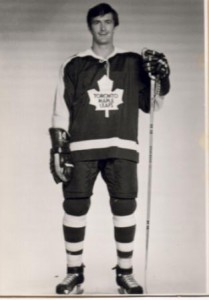 Born in 1945, this fine hockey player came up through the ranks of the Collingwood
Born in 1945, this fine hockey player came up through the ranks of the Collingwood
Minor Hockey System. He had played in numerous leagues previously but had
been rejected by umpteen more. On the strength of his booming shot, Alexander
once won a scoring championship playing Senior hockey with the Collingwood
Shipbuilders.
Following a nomadic Junior career, Alexander became one of the hockey’s last great amateur players. After a brief stint in minor-pro hockey in the mid-1960s, he returned home to Ontario and took a job as a milkman, while continuing to star with local senior amateur teams. A skilled defender with a booming shot, Alexander led the Orillia Terriers to the Allan Cup , awarded to Canada’s top amateur club, in 1973
He turned professional with Knoxville and in 1972 the Toronto Maple Leafs talked Alexander into giving pro hockey another chance, and he joined their Central Hockey League affiliate, the Oklahoma City Blazers the following year. He was an immediate hit, as he scored 60 points and was named the league’s top rookie and top defender.
In 1974-75, at the age of 29, Alexander was called up to the Leafs, making his NHL debut at the age of 29. He finished the season with 7 goals (including a hat-trick) and 17 points in 42 games. He spent most of the next two seasons on the Leafs’ roster, posting 21 points in 81 games, and made his most notable contribution in the 1976 playoffs with 6 points in 9 games.
For the 1977-78, Alexander was traded to the Vancouver Canucks. He split the season between the Canucks and their farm team in Tulsa, but made a substantial contribution with 26 points in just 32 games in Vancouver. The following season, he moved to the WHA with the Edmonton Oilers, posting 31 points on a team featuring Wayne Gretzky in his first professional season. He then spent two season playing in Germany for a two-year term, later coaching a junior team there and another team in Switzerland the year after before retiring in 1981.
Following his retirement, the Leafs hired him to coach their AHL affiliate in St. Catharine’s in 1984. In 1985, his preference for a private life to raise his family resulted in Claire leaving the organization.
Alexander finished his career with 18 goals and 64 points in 155 career NHL games, along with just 36 penalty minutes. He also recorded 8 goals and 31 points in 54 WHA games.
He played on Toronto Metro Old-timers, world’s champions for 1983.
Nowadays, he cheers on his daughter Buffy, representing Canada in rowing for the 2008 Olympic Games in Beijing. Beijing will be the third Olympics for Buffy Williams, who won a bronze medal with the women’s eight in Sydney in 2000 and placed fourth in the women’s pair in Athens in 2004 with partner Darcy Marquardt.
Claire was inducted into the Collingwood Sports Hall of Fame in 1984.
BILL ALLAN
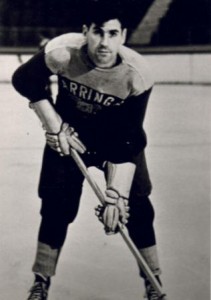 Although he excelled as an all around athlete, Bill Allan’s hockey career made him a
Although he excelled as an all around athlete, Bill Allan’s hockey career made him a
real traveling man. Not counting his minor hockey activities, Bill played on
nine teams in three countries and two continents.
Born in Victoria Harbour, he played minor hockey in Midland before moving to Wiarton, where his late father served as government Indian Agent.
The Allan family moved to Collingwood in 1935 where Bill made the Junior team the
first time out. After three years with the Collingwood Juniors he moved north
with Don Jeffery to Pomour Mines in the NorthernOntario Senior “A” League.
In 1939, Bill and Jeff came back to Collingwood just in time to help the
Collingwood Shipbuilders win the O.H.A. Intermediate “A” championship
under Bern Brophy.
He moved to the Port Colborne Sailors in 1940 and in 1941 joined the R.C.A.F.
During his training period as a wireless operator he found time to perform for
the R.C.A.F. team and the Truro Bearcats.
Following his discharge after the war, Bill moved out to the Pacific Coast League where he starred with the Portland Eagles in the years 1946-47-48.
He was on the move again in 1949 and this time he crossed the Atlantic
to play a bang up defensive game for the famed Harringay Greyhounds of the
English League.
It was back to Collingwood in 1950 as the Shipbuilders went to the finals against Port Colborne. Jack Portland, just back from a long N.H.L. career, coached that team.
Bill teamed up with Eddie Bush as the Shipbuilders won the O.H.A. Intermediate
“A” title in 1951. A severe eye injury put him out of action for most of the 1952 season but he came back to finish up his career with the Shipbuilders, Intermediate “A” finalists in 1953. He commanded the Kiwanis Ai Cadet Squadron and coached minor hockey teams for a number of years.
Hockey was not his only sport. Bill Allan can be rated as one of the best softball
pitchers ever to perform in the old Blue Mountain League. He pitched on two
championship ball teams in the early fifties with the Canadian Legion and
Trott’s Pros.
BARRY BARKER
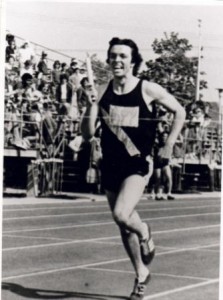 Barry Barker, as a multi-sport athlete, was inducted in the Collingwood Sports Hall of Fame, in 1996.
Barry Barker, as a multi-sport athlete, was inducted in the Collingwood Sports Hall of Fame, in 1996.
Barry Barker is probably most renowned for his years as a Collingwood Collegiate track and field star in the middle distances. His personal best times in the senior boys’ 800 metres and as a member of the school’s 4 X 400- metre relay team have not come close to being beaten in 20 years.
Among his accomplishments on the track were Georgian Bay region championships and a bronze at the Ontario championships in the senior boys’ 800 metre in 1976.
He also stands as the only CCI athlete invited to the world-class Maple Leaf Indoor Games, and was both a junior and senior athlete of the years at CCI. He also participated in football, basketball and cross-country running.
During his high school years, Barker also found time to play Jr. “B” hockey in Collingwood as a reserve netminder for the 1975-76 OHA finalists, and he reached the same stage the next year with the Alliston Jr. ‘C’ Hornets.
He has been coach of the CMHA Midget Rep. team throughout the 80’s and 90’s while playing on two local slo-pitch teams that went to the Canadian championships.
JAMES “TUB” BARRETT
James “Tubby” Barrett was one of the slickest stick handlers in Collingwood’s long hockey history and one of the games most potent scorers.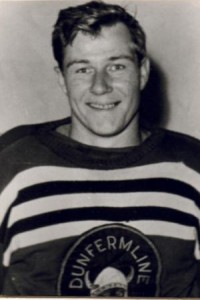
Small of stature but as tough as a pine knot, the “Tub” made monkeys out of
the opposing defensemen thirty years ago when the famed Collingwood Greenshirts
won four consecutive O.H.A. Junior “C” titles and the Intermediate
Shipbuilders won two back to back titles in 1951 and 1952.
In his hey day he worked on a super forward line with Allan Morrill and the late
Frankie Dance. The scoring records of this remarkable junior hockey trio will
probably stand forever.
One night I saw this line rack up 37 scoring points in a 20-3 win over Barrie. Barrett collected five goals and nine assists, Morrill had six goals and six assists and Dance
chalked up three goals and seven assists.
During the four-year reign of the Greenshirts in O.H.A. Junior “C” company,
Tub scored 174 goals, 139 assists for a total of 313 points in 113 games.
The line of Barrett-Morrill and Dance scored 444 goals during that four-year span.
At the same time, Barrett and Morrill, took part in the Intermediate “A” play-offs in 1952 and 1953, adding two more O.H.A. Medals to their collections. They played no small part in the winning of the two Intermediate titles for Eddie Bush. Tub Barrett and Allan Morrill picked up six O.H.A. championship medals in four years-the record still stands.
Barrett started his hockey career with the Collingwood Midgets in 1945 and was a member of the star studded Collingwood Clubs, winners of the Ontario Juvenile title in 1949. He tool a fling in the Scottish League in 1954 but came home before the end of the schedule and finished that season with Bracebridge. He played two more seasons with Collingwood before calling it a career. We have no way of
compiling an accurate record of Barrett’s goal scoring total over his brilliant ten year span, but a conservative estimate is four hundred goals.
His athletic prowess was not confined to hockey. Tub was a member of the
Collingwood Midget baseball team, Ontario Midget champions in 1947, under the
coaching of Brit Burns.
He was good enough to receive a pro tryout at a baseball camp in Toronto in 1949 as a catcher. From 1949 to 1952 he played baseball with Collingwood, Thornbury and Creemore and was a member of The Stayner O.A.B.A. Intermediate champions in 1957 and the Collingwood provincial finalists in 1958.
His shelf of silverware, with medals and trophies, representing provincial
championships, include: one juvenile, four junior and two intermediate hockey
medals, plus a junior and an intermediate medal for baseball at the provincial
level.
WILF “SCUTT” BELL
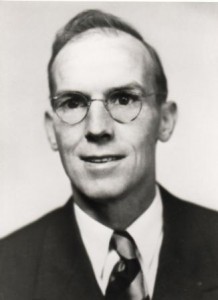 He was born December 11, 1912 in Grandview Manitoba and moved to this area
He was born December 11, 1912 in Grandview Manitoba and moved to this area
at the age of 6. He married S.E. (Nellie) Brock in 1942 and together they raised four children, 2 son, Allan and Jim and two daughters, Betty and Barb.
For several years he was an avid curler and member of the Collingwood Curling Club.
Wilf was the patriarch of softball in Nottawa both as a player or as a coach or as a
manager. He played softball from early school days as a catcher. Few base
runners could beat his peg from the plate to second base, always hit well over
.300 and gave everything he had in every game, even if the game was exhibition.
This trait continued into his coaching/managing career. He was a member of the
ball team of 1925 and was still with them 50 years later.
He started the first outdoor skating rink in Nottawa. Bob Martin and Wilf drew hot
water from Smart’s Cannery on First Street in Collingwood to flood the rink. He shared the dream of having a recreational park with ball lights in Nottawa and this
dream came true in 1969. He was a member of the Nottawa Recreation Committee
who without government grants, worked diligently to realize their dreams.
He was coach of the Nottawa Jardine Midget Club who won the Provincial Championship in 1967; they also won the Blue Mountain Softball title 3 years in a row. That same year the Nottawa Brocks Senior Ball Team won the All Ontario. Most of these players had played under the direction of Wilf in previous years. Therefore a village of 400 boasted two Provincial Championships in one year.
Five members of the 1967 Ontario Midget Championships, Don Gallagher (Collingwood Police Department), Bob Gallagher (Collingwood Police Department), Brad Leno, Les Draper and Dennis Rowbotham (Metro Police Department Mounted Division)became police officers. Jim Bell became a Veterinarian. Wilf also helped to
coach school teams under the direction of Joy Burkholder and Wayne Hartle. In
1977 Wilf coached the Nottawa Daals to the sixth championship in a row.
Wilf started his hockey career in 1960/61 as a manager. He managed teams coached by Dennis Robinson, Harvey Pearen, Cliff Rimmington and Bill Gurney. In 1967 he
managed the Legion Vets, who went on to become All Ontario Finalists, losing to
Leamington in a best of three series. He managed teams on which Paul Shakes and Randy Osburn played, both of whom went on to become NHL players.
Many of the boys managed by Wilf still play hockey today as well as on of his
coaches, Harvey Pearen, who plays on the Beaver Lumber Oldtimers over 45’s.
Wilf’s home was always open to the “young people” and many hours were spent
replaying the “games” until Wilf’s death on April 28, 1984.
NORMAN BOADWAY
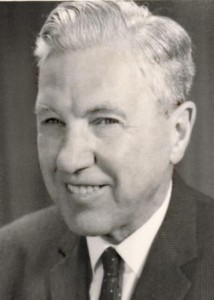 Skiing in the Collingwood area has come a long way since 1935 when a group of public
Skiing in the Collingwood area has come a long way since 1935 when a group of public
spirited citizen had the foresight to see that this winter pastime would some
day put the town and the whole Blue Mountain District on the map.
The whole country was in the depths of the Great Depression when a hundred dollars
looked like a small fortune.
One of the men who realized that there was “Gold in them there, Blue Mountains” was the late Norman Broadway.
He came to Collingwood in 1918 after his discharge from the Royal Canadian Navy,
still recuperating from injuries suffered in the Halifax explosion.
The late John Smart and Norman were driving up from Toronto one Sunday night watching the avalanche of cars speeding back in Toronto from the ski resorts in Huntsville. Norman remarked. “We have bigger and better hills in Collingwood. Why can’t we get in on the action.”
It may have been an “off-the-cuff” remark but it triggered a dream that eventually came true a few years later.
Mr. Smart, who was inducted into the Sports Hall of Fame, in 1978, and cut the Mr.
Boadway, lost no time in exploring the ways and means of getting the ball rolling.
They induced Fritz Loosli, a Swiss pro, to come to Collingwood and cut the first
trails after they negotiated a rental deal for the old Doherty property. An old log cabin was turned into a club house and the Collingwood Ski Club was eventually in business.
Now for a ski tow. The answer came when John David Eaton donated the motor from his wrecked Chrysler. The motor powered a wooden sleigh tow and the sleighs ere
built by the late Robert Morrill. The seats were built in Boadway’s cellar. During the first winter, Norman operated the motor and John sold tow tickets. The tickets sold for ten cents each.
Through his connections as manager of the Collingwood Terminals Ltd. elevator, Norman got Senator Peter Campbell and Gordon Leitch, a pair of big time financers, interested in the development. The rest is history. The development of the ski trails was not the only cause pioneered by Norman Boadway.
He was the driving force behind the birth of the Blue Mountain Crippled Children’s
Camp and the first Collingwood Yacht Club and the founding of the H.M.S. “Hood” through the Collingwood Branch of the Navy League. He helped organize the Collingwood Horticultural Society and served for many years on the General and Marine Hospital Board.
His interest in curling included the donation of the Collingwood Terminals Cup in
the late thirties. Norman Boadway died in October, 1965, in his 67th year.
ROY BROCK
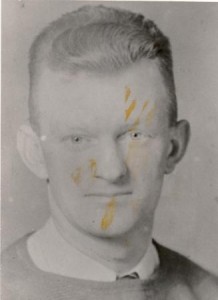 A Collingwood native, Roy was born on March 13, 1917.
A Collingwood native, Roy was born on March 13, 1917.
A renowned goal scorer, Roy played several years with the Collingwood Juniors and a member of the Barrie Juniors Ontario Championship club in 1937. A top scorer, he was invaluable for the Collingwood Intermediate Club winning the Ontario title in 1939. Additionally, Roy played with the Petawawa in the Allan Cup. As a professional, Roy Brock skated in New Haven, Three Rivers and
Knoxville.
Away from the ice, Roy was the club professional at the Collingwood Golf and Country Club for 20+ years.
BERN BROPHY
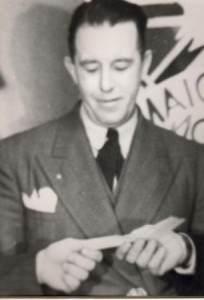 Born on Aug 9, 1903, Bern Brophy was truly one of Collingwood’s best all-around athletes. His induction into the Sports Hall of Fame was automatic.
Born on Aug 9, 1903, Bern Brophy was truly one of Collingwood’s best all-around athletes. His induction into the Sports Hall of Fame was automatic.
In hockey, Bern wore the uniforms of the Detroit Red Wings and the Montreal Maroons and you will find his name on the Stanley Cup with such names as Reg Noble, Clint Benedict, Punch Broadbent, Babe Seibert and Nels Stewart- all of them in the National Hockey Hall of Fame.
The Maroons sold him to Canadians, the Canadians sent him to Providence and Jack Adams brought him to Detroit to team up with a couple of more Collingwood natives-Reg Noble and Jack Herberts. He finished his pro career in the International League with Cleveland, Windsor and London and helped London win the league title in 1936.
Bern was re-instated as an amateur in 1938 and in 1939 he came back to Collingwood, and as a player-coach, led the Shipbuilders to the O.H.A. Intermediate “A” championship.
His athletic prowess was not confined to hockey. Visit the Sports Hall of Fame at Toronto and you will see a picture of the 1922 Queens University Football team, Canadian Intercollegiate champions. Seated in the middle row is Flying Wing B.L. Brophy.
An outstanding baseball player, Bern performed for many Collingwood ball clubs and was a member of Victoria Harbor provincial intermediate champs in the early twenties. His exploits in the realm of track and field are recorded in the archives of the Collingwood Collegiate where he won the junior, intermediate and senior athletic championships in three consecutive years.
He could qualify for Collingwood’s Hall of Fame as a Builder because it was Brophy who revived Intermediate hockey in Collingwood after the game had sunk to a low ebb from 1922 to 1938. It was a fitting climax to a great athletic career. He once said, “Before I hang up my skates, I would like to help Collingwood win another Intermediate Title!” Bern’s wish was granted. He died in his hometown of Collingwood on July 19, 1982.
MIKE BROPHY
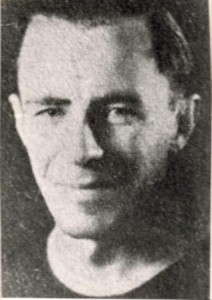 Mike Brophy was one of the slickest stick handlers ever to come out of theEast End mill pond.
Mike Brophy was one of the slickest stick handlers ever to come out of theEast End mill pond.
His hockey career lasted fifteen years, ten of them in the professional ranks. His
athletic ability was not confined to hockey for Mike was a hard hitting football halfback, a softball pitcher and infielder of not and a much better than average golfer.
The size of his hands, like two Maple Leaf hams, always fascinated me. He could
take a football from the centre, wrap his fist around the leather and sail through the line with both arms flailing. Mike played his first organized hockey with the Collingwood juniors in 1924.
In 1925, he was a member of an outstanding Collingwood junior club that
unfortunately ran into the Owen Sound Greys in the first round. The Greys, with
Cooney Weiland, Butch Keeling, Ted Graham and Dutch Cain, went on to win the
Memorial Cup.
Mike went to Owen Sound in 1926 and that club ended up in the O.H.A. Junior finals against Aura Lee. He turned professional with the Chicago Cardinals in 1927 and the next year found him in Hamilton in the old Can-Pro League under the coaching of Hap Holmes. The following year, Holmes moved the whole team to Cleveland in the International Leagues and Mike’s traveling days were over.
He became a hockey landmark in Cleveland and stared with that team for eight years until the end of his active career. During that time he helped Cleveland win the Calder Cup and three times led the league in scoring and made the All-Star team four times.
At one time he played with three other Collingwood born players on the Cleveland team-Reg Noble, Artie Clark and his brother, Bern.
Mike should have had a crack at the N.H.L in 1930 a deal was all set for a trade
with Montreal Canadians but Holmes balked and kept him in Cleveland.
Mike never got the chance again. He organized, managed and played for the Pros in
the first Collingwood Senior Softball League.
